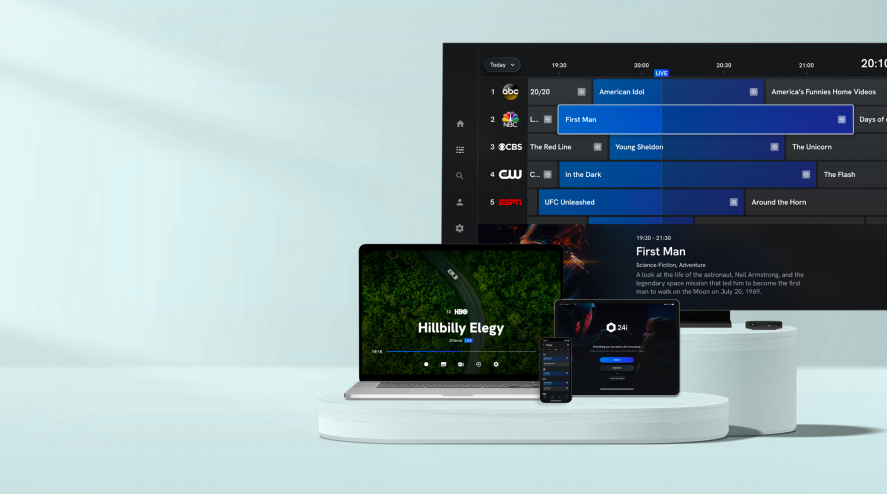How TVaaS Solves the Support and Maintenance Puzzle for Operators
TV-as-a-service enables operators to benefit from flexible, cloud-based services, sometimes in a hybrid deployment alongside on-prem technology

Launching a Pay TV service is hard work, but once up and running, operators face the new challenge of ongoing support and maintenance. Managing a multi-vendor solution is complex and requires ongoing investment of time and resources to ensure the operator addresses potential issues and stays on top of the necessary updates to features, operating systems, and security standards.
Keeping these tasks in-house or outsourcing them to a third-party systems integrator both come with additional costs that can be unsustainable for the smaller players in the industry and dramatically impact their competitive position in an already fiercely competitive market.
The TV-as-a-service (TVaaS) model enables operators to benefit from flexible, cloud-based services, sometimes in a hybrid deployment alongside on-premises technology. It’s a valuable alternative proposition for larger operators looking to control their costs, and an essential option for smaller players who find it to be a financially and operationally viable alternative to the fixed costs and increased complexity of traditional pay TV technology platforms.
Ongoing backend support can be challenging
A multi-vendor solution featuring several ‘best-of-breed’ technologies from different providers can seem an attractive proposition. But to keep these solutions going, operators have to rely on the systems integrator that puts the solution in place for maintenance and support throughout its lifetime or manage the technology in-house.
To avoid being locked into a long-term maintenance contract, the operator could choose to hire and train its in-house engineering team for issues monitoring and working with the various vendors. However, both options come with a cost that can be prohibitive for smaller Pay TV companies, Virtual Multichannel Video Programming Distributors (vMPVDs), and regional cable operators.
In particular, new startups that are building their subscriber base from zero might find having to endure the cost of ongoing systems integrator support or hiring a full, dedicated in-house team from day one unbearable. They must start as small as possible and scale their tech team alongside their subscriber base.
Keeping apps and operating systems at pace
While supporting and maintaining a multi-vendor backend infrastructure requires additional investment, there’s also significant ongoing effort to keep the front-end applications up-to-date. Identifying, diagnosing, and correcting technical issues or making changes in branding and functionality are key.
But even if the user experience remains unchanged, it still needs to be tested for compatibility with all supported devices after every operating and security system update the manufacturers apply.
Operators may choose to outsource the main design, development, and testing work to development partners. But if they target multiple devices, they are still likely to need an in-house team to manage the different vendors and ensure the integrations between the apps and backend infrastructure run smoothly.
Overcoming costs and complexity with TVaaS
To move beyond the challenges of ongoing complexity and associated costs, operators can benefit from a TVaaS model. This service enables operators to benefit from a hybrid or fully cloud-hosted Platform-as-a-service (Paas) model that allows them to take proper advantage of the flexibility, scalability, and robustness of private or public cloud hosting. Operators can offload most—or even all—of the day-to-day technology challenges of running and maintaining their Pay TV infrastructure to an experienced third party.
A managed service from a single provider comes with 24/7 incident monitoring, performance monitoring, capacity monitoring with alerting and proactive maintenance. This is a much more practical and cost-effective proposition for smaller operators than running their own full-scale engineering team.
With an established service management methodology like ITIL, all managed service aspects of the TV platform are clearly defined, demarcated and assigned, from development and release to updates and upgrades.
The managed services provider is responsible for managing any third-party elements of the solution and the operator benefits from additional features as they are added to the provider’s unified roadmap. An end-to-end solution also protects operators from a situation where one supplier for a particular function becomes acquired by a bigger technology company with different priorities or is rendered obsolete by rapid market evolution.
By contrast, with a multi-vendor solution, the systems integrator or in-house team would have to take ownership of integrating alternatives to any components that become at-risk or unsupported in these circumstances.
Offloading the support and maintenance burden with TVaaS
Launching is a milestone for every operator. To keep customer satisfaction high, both backend and frontend applications must remain up to date and deliver a uniform user experience across all devices.
The TVaaS model helps operators streamline their operations and stay at the cutting edge of innovation while moving from CAPEX to OPEX and reducing costs. Outsourcing maintenance and support enables operators to reduce the risk of delays and spiraling costs over time.
With a managed services provider being responsible for the day-to-day operation of the technology stack, operators can relocate staff and resources to focus on core business tasks like acquiring great content, refining the consumer offering, winning and retaining subscribers.
In a fiercely competitive market, smart operators can use TVaaS as a value driver to save on costs, increase agility, and stay ahead of the competition.
Lennart Broers is Sales Director Operator Solutions for 24i
Get the TV Tech Newsletter
The professional video industry's #1 source for news, trends and product and tech information. Sign up below.

Lennart Broers is Sales Director Operator Solutions, 24i
